Ditapis dengan

Maka Berbicaralah Zarathustra: Bacaan Untuk Siapa-siapa dan Bukan Untuk Siapa…
- Edisi
- Cetakan ke-1
- ISBN/ISSN
- 979-429-166-8
- Deskripsi Fisik
- 103 hlm.; 21 cm.
- Judul Seri
- -
- No. Panggil
- 833 NIE m
- Edisi
- Cetakan ke-1
- ISBN/ISSN
- 979-429-166-8
- Deskripsi Fisik
- 103 hlm.; 21 cm.
- Judul Seri
- -
- No. Panggil
- 833 NIE m
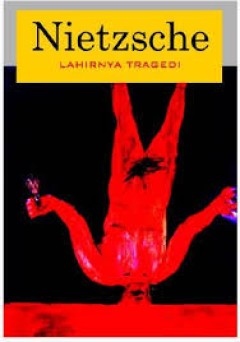
Lahirnya Tragedi Friedrich Nietzsche
Lahirnya Tragedi (The Birth of Tragedy) adalah buku pertama Friedrich Nietzsche. Seorang filsuf kenamaan Jerman dan ahli ilmu filologi. Edisi pertama buku ini diterbitkan 2 Januari 1872, judul lengkapnya The Birth of Tragedy out of the Spirit of Music, sebagai edisi kedua, edisi 1874 sangat sedikit revisi. Ketika ia menerbitkan kembali buku itu tahun 1886, Nietzsche memberi nama baru The Birth…
- Edisi
- Cetakan ke-1
- ISBN/ISSN
- 978-979-168-537-5
- Deskripsi Fisik
- xlviii + 212 hlm.; 21 cm.
- Judul Seri
- -
- No. Panggil
- 800 NIE l
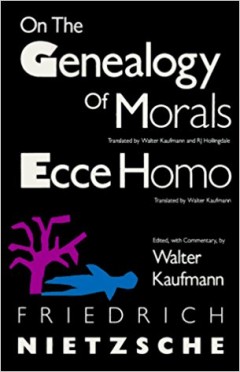
On the Genealogy of Morals and Ecce Homo
The great philosopher's major work on ethics, along with Ecce Homo, Nietzche's remarkable review of his life and works. On the Genealogy of Morals (1887) shows him using philsophy, psychology, and classical philology in an effort to give new direction to an ancient discipline. The work consists of three essays. The first contrasts master morality and slave morality and indicates how the term …
- Edisi
- -
- ISBN/ISSN
- -
- Deskripsi Fisik
- viii + 367 pg.; 18,5 cm.
- Judul Seri
- -
- No. Panggil
- 170 NIE o
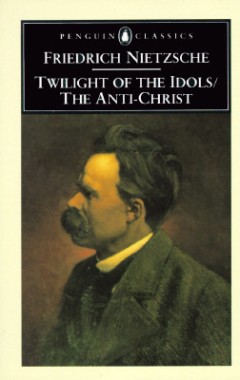
Twilight of The Idols/The Anti-Christ
Twilight of the Idols, 'a grand declaration of war' on all the prevalent ideas of his time, offers a lightning tour of his whole philosophy. It also prepares the way for The Anti-Christ, a final assault on institutional Christianity. Yet although Nietzsche makes a compelling case for the 'Dionysian' artist and celebrates magnificently two of his great heroes, Goethe and Cesare Borgia, he also g…
- Edisi
- -
- ISBN/ISSN
- -
- Deskripsi Fisik
- 206 pg.; 18 cm.
- Judul Seri
- -
- No. Panggil
- 179.3 NIE t.a
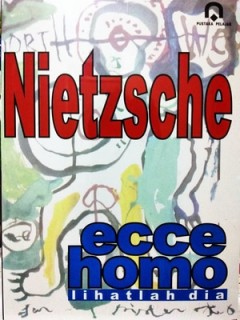
Ecce Homo = Lihatlah Dia
Akulah yang pertama menemukan kebenaran, Akulah yang pertama merasakan dengan indera - mencium - dusta sebagai dusta. Telah kupilih untuk diriku sendiri kata imoralis sebagai marka pembeda dan lencana kehormatan, Aku bangga memiliki kata ini yang mempersiapkan aku melawan segenap kemanusiaan - (Friedrich Nietzsche, Mengapa Aku Adalah Takdir)-
- Edisi
- -
- ISBN/ISSN
- 9799075211
- Deskripsi Fisik
- lvi + 174 hlm.; 20,5 cm.
- Judul Seri
- -
- No. Panggil
- 193 NIE e

Untimely Meditations
- Edisi
- -
- ISBN/ISSN
- 0521247403
- Deskripsi Fisik
- xxxii + 256 pg.; 23 cm.
- Judul Seri
- -
- No. Panggil
- 193 NIE u
- Edisi
- -
- ISBN/ISSN
- 0521247403
- Deskripsi Fisik
- xxxii + 256 pg.; 23 cm.
- Judul Seri
- -
- No. Panggil
- 193 NIE u

Daybreak: Thoughts on the Prejudices of Morality
- Edisi
- -
- ISBN/ISSN
- 0521243963
- Deskripsi Fisik
- xvii + 233 pg.; 23 cm.
- Judul Seri
- -
- No. Panggil
- 193 NIE d
- Edisi
- -
- ISBN/ISSN
- 0521243963
- Deskripsi Fisik
- xvii + 233 pg.; 23 cm.
- Judul Seri
- -
- No. Panggil
- 193 NIE d
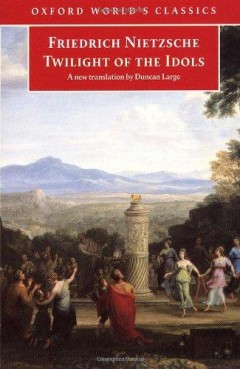
Oxford World's Classics : Twilight Of The Idols or How To Philosophize With a…
Twilight of the Idols. Nietzsche's own unabashed appraisal of the last work intended to serve as a short introduction to the whole of his philosophy, and the most synoptic of all his books, bristles with a register of vocabulary derived from physiology, pathology, symptomatalogy and medicine. This new translation is supplemented by an introduction and extensive notes, which provide close analys…
- Edisi
- -
- ISBN/ISSN
- 0192831380
- Deskripsi Fisik
- xlii + 124 pg.; 20 cm.
- Judul Seri
- -
- No. Panggil
- 179.3 NIE t

On the Adwantage and Disadvantage of History for Life
- Edisi
- -
- ISBN/ISSN
- 0915144956
- Deskripsi Fisik
- 64 pg.; 23 cm.
- Judul Seri
- -
- No. Panggil
- 128 NIE o
- Edisi
- -
- ISBN/ISSN
- 0915144956
- Deskripsi Fisik
- 64 pg.; 23 cm.
- Judul Seri
- -
- No. Panggil
- 128 NIE o

Human, All Too Human ; A Books For Free Spirits
This volume presents Nietzsche's remarkable collection of almost 1400 aphorisms in R. J. Hollingdale's distinguished translation, together with a new historical introduction by Richard Schacht. Subtitled "A Book for Free Spirits," Human, All Too Human marked for Nietzsche a new "positivism" and skepticism with which he challenged his previous metaphysical and psychological assumptions. Nearly a…
- Edisi
- -
- ISBN/ISSN
- 0521265436
- Deskripsi Fisik
- xix + 395 pg.; 23 cm.
- Judul Seri
- -
- No. Panggil
- 193 NIE h
 Karya Umum
Karya Umum  Filsafat
Filsafat  Agama
Agama  Ilmu-ilmu Sosial
Ilmu-ilmu Sosial  Bahasa
Bahasa  Ilmu-ilmu Murni
Ilmu-ilmu Murni  Ilmu-ilmu Terapan
Ilmu-ilmu Terapan  Kesenian, Hiburan, dan Olahraga
Kesenian, Hiburan, dan Olahraga  Kesusastraan
Kesusastraan  Geografi dan Sejarah
Geografi dan Sejarah